#xie xincheng
Explore tagged Tumblr posts
Text

"no, he yu, I can't get pregnant"
#bab#bing an ben#hexie#he yu#xie xincheng#case file compendium#meatbun#meatbun doesn't eat meat#danmei
81 notes
·
View notes
Text
just realised that I reached 100 followers here, so a big thank you to everyone who's been here with me and my sporadic posts <333
just as a bit of a signal boost, I am open to taking requests, so if you'd like to see more particular types of content don't be afraid to drop an ask, especially if they are of any of my favorites below ^^
Actively following: Ni Ni, Wen Qi, Qiu Tian, Bao Shangen
Like, but not actively following: Zhou Yiran, Guo Xiaoting, Xin Zhilei, Hu Lianxin, Lu Yangyang, Zhou Yutong, Lu Yuxiao, Zhao Jiamin, Sun Zhenni, Chen Duling, Li Muchen, Zeng Keni, Zhang Jingyi, Zhang Yaqin, Li Jiaxin, Li Gengxi, Zhuang Dafei, Tian Xiwei, Xia Meng, Deng Enxi, Jianaina, Wang Shengdi, Chen Zhiyan // Wang Kai, Hu Ge, Zheng Yecheng, Zhang Xincheng, Yi Yangqianxi, Wang Xiao, Bai Yufan, Jiang Qiming, Yu Shi, Ci Sha, Bai Jingting, Wei Daxun, Rong Zishan
Mother: Reyizha, Maggie Cheung, Gong Li, Joey Wong, Brigitte Lin, Zhou Xun, Shu Qi, Liu Mintao
Animation: Shanghai Animation Film Studio, Nice Boat Animation, Light Chaser Studio, Flint Sugar, Studio Tumble, Haoliners Animation, Curie Lu, Zhou Fanyuan
Fashion: He Cong, Ju Xiaowen, Liu Wen, Chen Man, Zeng Wu, Leslie Zhang, Win Tam, Chen Momo, Liu Zongyuan, Valentina Li, Clive Xiong, Cindy Chao, Rui Zhou, Robert Wun, SHUSHU/TONG, Susan Fang
Music: Lexie Liu, Faye Wong, SNH48 Group, Jingfei, Floruitshow, 一支榴莲, Zhou Shen, Mr Miss, Ayanga, Zheng Yunlong, Yikii, liiii, Re-TROS, Zhang Bichen
Dance: Hao Ruoqi, Xie Xin, Hu Shenyuan, Li Yu, Hu Jie, Li Yanchao, Li Xing, Hua Xiaoyi, Tang Shiyi, Li Xiang, Zhang Han, Yang Liping
3 notes
·
View notes
Text
Upcoming Shows in the Lost Tomb Series
This post is outdated and will not be updated until further notice. Please check the #dmbj tag for updates.
None of these English titles are official and are subject to change when they air. MyDramaList version
Post-Filming
1. Wu Xie’s Private Notes is a planned television series about Wu Xie’s thoughts and notes throughout the early main series(?).
Cast: Rumored cast is Xu Zhenxuan, Wu Zhenyu, Cheng Xiang, & Sun Gechuanye
Order: (don’t know for sure)
Pre-Production
1. The Southern Archives is a side-story television series starring Zhang Haiyan.
Cast: Rumored cast is Zhang Xincheng
Order: Before The Mystic Nine. It takes place during the early Republican Era (1912-1920s).
2. Flowery Night may be a planned television series or a movie about Xie Yuchen and Hei Yanjing.
Cast: No rumored cast
Order: After Reunion
3. Tomb of the Sea 2 is a planned television series that will follow Tomb of the Sea.
Cast: No rumored cast
Order: After Tomb of the Sea and before Reunion
4. The Mystic Nine 2 is a planned television series announced by iQIYI.
Cast: No cast announced.
Order: After The Mystic Nine and before The Lost Tomb
Unknown Stage
Seven Star Lu Palace—a planned animated series based on the first part of Volume 1. There’s no info on what stage of production this show is in.
#cdrama#dmbj#daomu biji#tibetan sea flower#the southern archives#southern archives#the lost tomb series#grave robbers chronicles#tmbj
251 notes
·
View notes
Text
Administrative geography of Western Han (34,107)
According to Ban Gu's Book of Han.

Sili司隸
Jingzhaoyin京兆尹
Chang'an長安
Xinfeng新豐
Chuansikong船司空
Lantian藍田
Huayin華陰
Zheng鄭
Hu湖
Xiagui下邽
Nanling南陵
Fengming奉明
Baling霸陵
Duling杜陵
Zuopingyi左馮翊
Gaoling高陵,
Yueyang櫟陽
Didao翟道
Chiyang池陽
Xiayang夏陽
Ya衙
Suyi粟邑
Gukou谷口
Lianzhuo蓮勺
Fu鄜
Pinyang頻陽
Linjin臨晉
Zhongquan重泉
Heyang郃陽
Duixu祋祤
Wucheng武城
Chenyang沈陽
Huaide褱德
Cheng徵
Yunling雲陵
Wannian萬年
Changling長陵
Yangling陽陵
Yunyang雲陽
Youfufeng右扶風
Weicheng渭城
Huaili槐里
Hu鄠
Zhouzhi盩厔
Tai斄
Yuyi郁夷
Meiyang美陽
Mei郿
Yong雍
Qi漆
Xunyi栒邑
Yumi隃麋
Chencang陳倉
Duyang杜陽
Haozhi好畤
Guo虢
Anling安陵
Maoling茂陵
Pingling平陵
Wugong武功
Hongnong弘農郡
Hongnong弘農
Lushi盧氏
Shan陝
Yiyang宜陽
Mianchi黽池
Xin'an新安
Luhun陸渾
Hedong河東郡
Anyi安邑
Dayang大陽
Yishi猗氏
Xie解
Pufan蒲反
Heibei河北
Zuoyi左邑
Fenyin汾陰
Wenxi聞喜
Huoze濩澤
Duanshi端氏
Linfen臨汾
Yuan垣
Pishi皮氏
Changxiu長脩
Pingyang平陽
Xiangling襄陵
Zhi彘
Yang楊
Beiqu北屈
Puzi蒲子
Jiang絳
Huzhe狐讘
Qi騏
Henei河內郡
Huai懷
Ji汲
Wude武德
Bo波
Shanyang山陽
Heyang河陽
Zhou州
Gong共
Pinggao平皋
Zhaoge朝歌
Xiuwu脩武
Wen溫
Yewang野王
Huojia獲嘉
Zhi軹
Qinshui沁水
Longlü隆慮
Tangyin蕩陰
Henan河南郡
Luoyang��陽
Xingyang滎陽
Yanshi偃師
Jing京
Pingyin平陰
Zhongmou中牟
Ping平
Yangwu陽武
Henan河南
Goushi緱氏
Quan卷
Yuanwu原武
Gong鞏
Gucheng穀成
Gushi故市
Mi密
Xincheng新成
Kaifeng開封
Chenggao成皋
Yuanling苑陵
Liang梁
Xinzheng新鄭
Bing 并州
Taiyuan太原郡
Jinyang晉陽
Jiexiu界休
Yuci榆次
Zhongdu中都
Zishi茲氏
Wu鄔
Pingtao平陶
Jingling京陵
Daling大陵
Qi祁
Shang'ai上艾
Yangyi陽邑
Shangdang上黨郡
Changzi長子
Zhunliu屯留
Yuwu余吾
Tongdi銅鞮
Zhan沾
Nieshi涅氏
Xiangyuan襄垣
Huguan壺關
Xuanshi泫氏
Gaodu高都
Lu潞
Yishi陭氏
Yang'e陽阿
Guyuan穀遠
Shang上郡
Dule獨樂
Yangzhou陽周
Pingdu平都
Qianshui淺水
Xiangluo襄洛
Qiyuan漆垣
Sheyan奢延
Diaoyin雕陰
Diaoyindao雕陰道
Dingyang定陽
Gaonu高奴
Xihe西河郡
Zhongyang中陽
Gaolang皋狼
Pingzhou平周
Lin藺
Lishi離石
Xicheng隰成
Tujun土軍
Yinshan陰山
Yan 兗州
Dong東郡
Puyang濮陽
Baima白馬
Nanyan南燕
Chenliu陳留郡
Chenliu陳留
Xiaohuang小黃
Yongqiu雍丘
Suanzao酸棗
Donghun東昏
Waihuang外黃
Fengqiu封丘
Changluo長羅
Weishi尉氏
Changyuan長垣
Pingqiu平丘
Jiyang濟陽
Junyi浚儀
Huaiyang淮陽國
Yangjia陽夏
Fugou扶溝
Yu圉
Yu 豫州
Yingchuan潁川郡
Yangdi陽翟
Changshe長社
Yingyin潁陰
Chonggao崇高
Xu許
Yanling傿陵
Cheng'an成安
Zhouchengxiu周承休
Yangcheng陽城
Lunshi綸氏
Ji冀州
Zhao趙國
Handan邯鄲
Yiyang易陽
Bairen柏人
Xiangguo襄國
Guangping廣平國
Guangping廣平
Zhang張
Zhaoping朝平
Nanhe南和
Lieren列人
Chizhang斥章
Ren任
Quliang曲梁
Guangxiang廣鄉
Pingxiang平鄉
Guangnian廣年
Zhending真定國
Gaocheng稿城
Wei魏郡
Ye鄴
Chiqiu斥丘
Sha沙
Neihuang內黃
Fanyang繁陽
Liangqi梁期
Liyang黎陽
Jifei即裴
Wushi武始
Hanhui邯會
Hangou邯溝
Wu'an武安
Julu��鹿郡
Julu鉅鹿
Guang'e廣阿
Xiangshi象氏
Yingtao廮陶
Songzi宋子
Yangshi楊氏
Jingwu敬武
Baixiang柏鄉
Changshan常山郡
Yuanshi元氏
Shiyi石邑
Fangzi房子
Zhongqiu中丘
Fengsi封斯
Guan關
Pingji平棘
Hao鄗
Liang涼州
Wudu武都郡
Gudao故道
Anding安定郡
Gaoping高平
Fulei復累
Anbei安俾
Fuyi撫夷
Zhaonuo朝那
Jingyang涇陽
Linjing臨涇
Lu鹵
Wuzhi烏氏
Yinmi陰密
Anding安定
Canluan參䜌
Sanshui三水
Yinpan陰槃
Anwu安武
Julei祖厲
Yuande爰得
Xunjun眴卷
Pengyang彭陽
Chunyin鶉陰
Yuezhidao月氏道
Anding安定郡
Fuyi撫夷
Linjing臨涇
Yinmi陰密
Anding安定
Canluan參䜌
Yinpan陰槃
Anwu安武
Yuande爰得
Pengyang彭陽
Beidi北地郡
Maling馬領
Zhilu直路
Xuyan昫衍
Fangqu方渠
Chungu鶉孤
Guide歸德
Lüepandao略畔道
Niyang泥陽
Yuzhi郁郅
Yiqudao義渠道
Yiju弋居
Dayao大𦥼
Not located
Taiyuan太原郡
Yuli于離
Guangping廣平國
Pingli平利
Yangtai陽臺
Chengxiang城鄉
Julu鉅鹿郡
Wutao武陶
Changshan常山郡
Pingtai平臺
Duxiang都鄉
Beidi北地郡
Chudao除道
Wujie五街
Huihuo回獲
County locations and ancient rivers, lakes, and shorelines from The Historical Atlas of China.
I have intentionally stuck to the Hanshu where it differs from the Historical Atlas.
3 notes
·
View notes
Note
20.) Tell us the meta about your writing that you really want to ramble to people about (symbolism you’ve included, character or relationship development that you love, hidden references, callbacks or clues for future scenes?)
oooooohhhhhh you’ve really done it now. I. Have. So much meta feelings. Omg. This is gonna be a long one. If u couldn’t tell i am a whole-ass meta HO and literally any of my work is going to have like. Layers and layers of meta work done in the background. I do a lot of classical literature work so I’m talking shit like writing the ending speech to a play based on The Tempest in the exact meter and rhyme scheme as the ending speech in that play.
Okay I’m going to do Swiftly Tilting meta bc that’s what most of you know, but if anyone would like to here about the Biggest Dramaturgical Undertaking of my Life, my Untimely Ripped senior thesis project, lemme know ;)
OKAY SO SOME META THINGS I PUT IN SWIFTLY TILTING
this one was mostly about the foreshadowing I think; there was soooo many steps and hints and stuff I was trying to throw in along the way, and a lot of people picked up on them, which was SO FUN. uhhhh. There are some things that turned into plot holes a little bit but there are a few bits that stayed pretty hidden! Like the fact that Jiang Zisuan was the full-blooded human that Wang Meng scented out in Chapter One, not Mao Xincheng. Um I loved putting in all of the species differences and tie-ins to canon, that was super fun. Oh! The journal that Sanshu found when researching Yincangui was Fo-ye’s! Zhang Rishan had put it on the ship and then lost it when he was trying to turn around and go back but was freaking out and all that stuff. Wu Xie isn’t actually a Shouling because he doesn’t own the ship, Sanshu does, but his crew call him that anyway because that’s what he is to them. Normally Kylin would have others of their species with them during regenerations to form those mental tethers, but since Zhang Rishan and Xiao-ge didn’t, Liu Sang was able to keep them psychically linked to avoid losing their memories. Since Liu Sang didn’t remember the execution frequency, he killed the metal porcupine monster on Lehan by literally just Screaming At It. After the gang leaves Yincangui it eventually just gets lost Permanently. Liu Sang never goes back. Huo Daofu insists that Zhang Rishan isn’t human at every single Nine Bloodlines meeting and everyone refuses to believe him and it drives him insane.
the other thing that I really enjoyed was the different POVs, especially the use of swear words in them??? Xiao Bai would swear, but only in dialogue. Kan Jian didn’t swear at all in his chapter, I don’t think. Pangzi used swear words like every other line (also was not as introspective as the other characters, which is why his chapter is one of my favorites? even though they’re grounded, it seems so active because Pangzi’s constantly in the action, he’s not ruminating on things like all of the others). Wang Meng only swore when Li Cu was in danger I’m pretty sure (also loved doing colors and sounds and smells and different senses with his POV). Xiao-ge swore when he though it was something Wu Xie would say (I also loved giving different emotional weight to his sentences and the ones in parentheses, as well as switching between Xiao-ge calling himself Xiao-ge or Zhang Qiling, depending on the level of danger they were in). Li Cu used Capital Letters to Emphasize Important Words A Lot (@jockvillagersonly pointed out that Li Cu’s chapter was literally just how I talk which I think is funny as shit) and swore a good amount bc he had picked it up from Wu Xie and Pangzi. Liu Sang didn’t swear because he was Literally A Baby (those chapters were also interesting because I had to keep him in the mindset of a child; there were so many ways things could have gone but he was a kid and he was panicking and he didn’t know how to handle a lot of things emotionally, so there’s a lot left out that an older narrator would have gotten). Wu Xie was sort of a combination of all of the pov voices we’ve had so far, which made sense because of how in-tune he was with the languages of his crew.
snake language for Li Cu! I used a lot of words like coiled and constricted and hissed and slithered and struck when describing his words and actions to really drive home his snake-like nature even before I revealed his species heritage.
I wrote all of the Fo-ye and Zhang Rishan backstory before I had seen much of Mystic Nine so I killed Ba-ye without knowing the Implications. I’m so sorry Ba-ye.
all of the acoustic stuff!!! the acoustic levitation and sound in space and sonic illusions were researched and like. hashed out before I wrote them! So theoretically they could all be real. I was like. deep in the science articles lmao.
ALSO!!! ON THAT NOTE (haha)!!! Liu Sang’s name in Yincanguian was an A-flat four. Su Baiyin’s was a G-major five, and if you plug all the frequencies listed in the journal into a frequency generator on the internet, you can hear what those words sound like in their language.
Liu Sang originally was going to be from a planet called Wangcen lmao. Also in the original outline they were going to completely destroy Yincangui and also pretty much all of Liu Sang’s backstory did not exist.
At the end of the fic, Sanshu is living with Chen Wen-Jin!
AH THERE WAS A LOT!!! Swiftly Tilting was literally so much fun to write, and so much fun to see what people caught, because everyone noticed different things!!! <3
Thank you so much for the ask, I live for this shit.
6 notes
·
View notes
Text
Review of the Tokyo National Museum Three Kingdoms Exhibit (July 2019), Part 2/2
Apologies for the delay, busy week.
The second half of the exhibit starts strong, exploring the tomb of one of the greats:

(Read: Zhu Ran of Wu)
They had a couple of artifacts from Zhu Ran on display, including his personal seals and offerings buried with him:





Strangely, the seal of Cao Xiu was also displayed here. Maybe Zhu Ran captured it? Unclear, regardless.

The next few sections detail artifacts that look at specific kingdoms, starting with Wei. Many of these items were found in Luoyang as well as around Hefei Xincheng. Personal favourites include the calligraphy (due to how well preserved it is) as well as the Liubo board:





Towards the end of the Wei section there was a section dedicated to the Gongsun clan and the Liaodong Peninsula:





My easy pick favourite part of this section was that they had a chunk of the stele glorifying Guanqiu Jian (or Wuqiu Jian) and his exploits during the Goguryeo War

Next up are artifacts from the Shu region, which include statues, figurines and carvings






(Good Woofer)
The Wu section had some interesting artifacts, including coinage, which demonstrate how important trade was in the region:





This discussion on trade naturally facilitated a discussion on Shi Xie and his influence in the region




The centrepiece of the exhibit was a scale recreation of a section of the (alleged) Tomb of Cao Cao (Emperor Wu of Wei)





Personal favourite here was the Xianbei belt buckles which are presumed to be from the collection of Emperor Wen of Wei (Cao Pi), as he was a known collector of Xianbei belt buckles


Also here’s a Cao Zhi Samurai Puppet:

After the Cao Cao tomb, they showed a bunch of artifacts from various unidentified tombs from Wu and Shu for comparison.





The Shu Tree Carving and Dragon-Dog things are pretty cool.
The last section talked about the end of the Three Kingdoms Period, and the successive loss of the North to the Five Barbarian Tribes. Honestly the artifacts from this section are pretty boring, so here are some drinking gourds from Wang Xizhi’s ancestral home.

To conclude, would I say that I enjoyed the exhibit? I would give it a 7/10. Some of the stuff was quite interesting from a social history perspective. Perhaps not as interesting as the political intrigue or the battles, but it was a fairly unique experience, collecting artifacts from across the world.
Plus I got the best merch to ever exist

53 notes
·
View notes
Text
2019′s Guzhuang Dramas
Looking for a guzhuang to watch? Here’s a full compilation of the most popular ones! They will be ranked by the douban ratings (a Chinese rating site), and the MDL ratings will be in brackets. In a case of a tie, I chose the drama with a higher percentage of 5 star ratings on douban. In addition, the time period, main stars, plot and episode number will be provided:
Format: Name (Chinese Name) - Douban rating [MDL rating]
1. Love and Destiny (宸汐缘) - 8.3 [8.7]
Time Period: Xianxia
Starring: Zhang Zhen (张震), Ni Ni (倪妮)
Episode Number: 60
Plot: A love story between the God of War and a young maiden whose very existence can bring harm to the world.
Related Shows: Eternal Love (三生三世十里桃花), Ashes of Love (香蜜沉沉烬如霜), The Journey of Flower (花千骨)
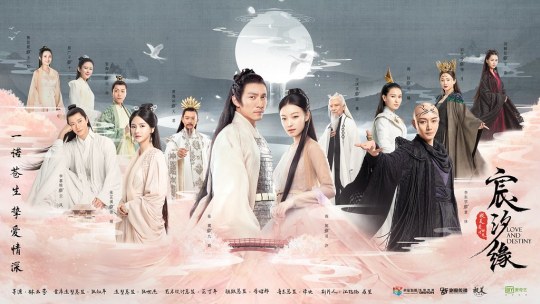
2. The Untamed (陈情令) - 8.3 [9.4]
Time Period: Wuxia
Starring: Xiao Zhan (肖战), Wang Yibo (王一博)
Episode Number: 50
Plot: Wei Wuxian and Lan Wangji are two completely different people from two different worlds. Lan Wangji was born in the prominent Sect of the Gusu Lan. Due to his great achievements and reputation, he was seen as a hero, the role model of everyone in the cultivation world and is known to appear wherever chaos is. While Wei Wuxian, the Yiling Patriarch,was a name that was feared by everyone. He has done many heroic things in his life, but also really cruel ones. In the end, Wei Wuxian was "killed" by his best friend and only survivor of the Yunmeng Jiang Sect, Jiang Cheng, who was once like a brother to him, after he became too evil for the world to exist. At least that is what the legend says. Sixteen years after his so-called “death”, Wei Wuxian suddenly reappeared again at the Mo Village.
3. The Longest Day in Chang An (长安十二时辰) - 8.3 [8.9]
Time Period: Tang Dynasty
Starring: Lei Jiayin (雷佳音), Jackson Yee (易烊千玺)
Episode Number: 48
Plot: 744 A.D, Chang’an. The remnants of a vanquished Central Asian kingdom have infiltrated the world’s largest city for a planned attack during the Lantern Festival. Meanwhile, the court is fraught with infighting. The aging Emperor is expected to announce the regency of the Right Chancellor during the festival and retreat to the mountains with his young lover. If the Right Chancellor becomes the regent, the reformist Crown Prince risks being deposed—or worse. Intelligence chief Li Bi, a young Taoist priest, and ally of the Crown Prince has only 24 hours to prevent both the attack and the regency. After a botched attempt to capture the infiltrators, Li Bi and his team call in the services of death row prisoner Zhang Xiao Jing — a war veteran, beloved police chief, and murderer of his last direct superior.

4. Young Blood (大宋少年志) - 8.2 [8.3]
Time Period: Song Dynasty
Starring: Zhang Xincheng (张新成), Zhou Yutong (周雨彤)
Episode Number: 42
Plot: During the Qingli Era, troubling affairs brew underneath the prosperity and stability of the Northern Song Dynasty. To avoid war and protect the peace between its people, the Northern Song uses the name of "Mi Ge" (Secret Cabinet) to train young spies. For a variety of reasons and whether willing or unwilling, these six become the Seventh Room of Mi Ge after strict selection and examination: Yuan Zhong Xin, Zhao Jian, Xiao Jing, Wang Kuan, Xue Ying, Wei Ya Nei. Upon first entering the school, each acts out of their own self-interest, making a mess of their surroundings and causing headaches for their teachers. After going through a series of life-and-death missions, the previously ignorant boys and girls gradually mature and form bonds with one another, devoting their determination and loyalty to defending the peace. Burying their names, they become unknown legends within the river of history.
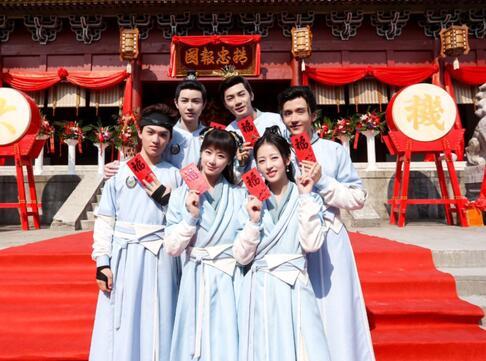
5. Goodbye My Princess (东宫) - 7.6 [8.4]
Time Period: Fictional
Starring: Chen Xingxu (陈星旭), Peng Xiaoran (彭小苒)
Episode Number: 55
Plot: A love story revolves around the 9th Princess of Western Liang as she journeys to the Central Plains to fulfill a marriage alliance with the Crown Prince. Two parallel lines begin to intersect in a place fraught with danger and deadly power play and buried somewhere deep inside are memories that have yet to resurface.
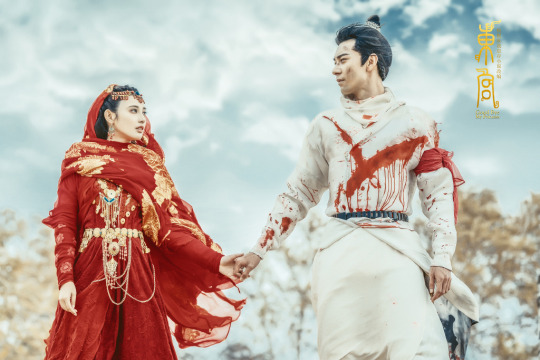
6. The Birth of the Drama King (少年江湖物语) - 7.5 [7.7]
Time Period: Wuxia
Starring: Zhou Yanchen (周彦辰), Luo Mingjie (骆明劼)
Episode Number: 24
Plot: A hilarious comedy about two long lost brothers who meet again as enemies in the pugilistic world with the "righteous" hero infiltrating the "evil" dark lord's sect as an undercover agent. Hijinks ensue when the introverted hero tries to befriend the temperamental dark lord by following his master's self-help book on "how to make a friend in ten days."
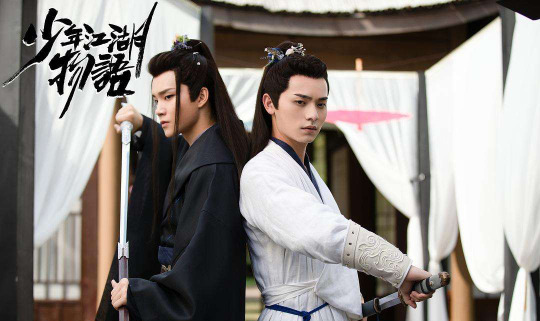
7. Hot Blooded Youth (热血少年) - 7.2 [7.9]
Time Period: Chinese Republic
Starring: Huang Zitao (黄子韬), Zhang Xueying (张雪迎)
Episode Number: 58
Plot: A legendary story about a young man who overcomes many hardships to become a formidable force in the Shanghai Bund. Xiong Tian grew up in the streets. With nothing to his name, he works a thankless job just to make a living. Nonetheless, he is quick-witted, talented and exceptionally gifted in steam-powered machinery. By chance, he gets pulled into a complicated fight and works his way to become a champion.

8. Once Upon A Time in Lingjian Mountain (从前有座灵剑山) - 7.2 [8.5]
Time Period: Wuxia
Starring: Xu Kai (许凯), Zhang Rongrong (张榕容)
Episode Number: 37
Plot: A story that follows Wang Lu, a young genius, who enters the Spirit Blade Sect and embarks on an unconventional journey towards immortal cultivation.
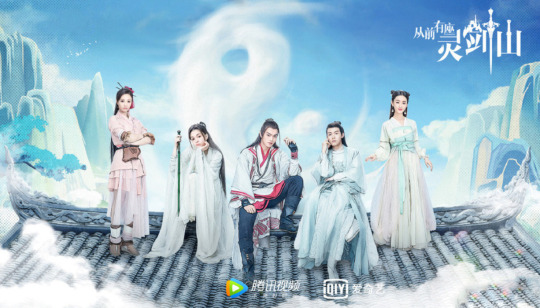
9. Candle in the Tomb (怒晴湘西) - 7.1 [8.2]
Time Period: Chinese Republic
Starring: Pan Yueming (潘粤明), Gao Weiguang (高伟光)
Episode Number: 21
Plot: The third season of the Candle in the Tomb series is set in the Republican era during a time when the warlords fight for power and bring disaster upon the people. Tomb raider and head of the Xieling Clan Chen Yu Lou joins hands with warlord Luo Lao Wai and heads to Xiangxi to explore tombs of the Yuan dynasty. On his journey he meets Zhe Gu Shao who is not interested in any treasures but wants to find a magical bead that can put an end to the curse on his clan. Yu Lou and Gu Shao eventually form an alliance to tread the untrodden path to the Yuan tombs.
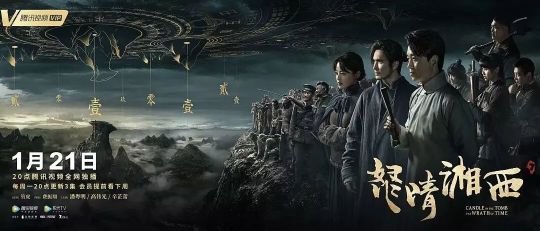
10. Lovely Swords Girl (恋恋江湖) - 6.9 [7.7]
Time Period: Fictional
Starring: Jiang Zhenyu (姜贞羽), Wang Shize (王仕泽)
Episode Number: 24
Plot: Set in a fictional history rife with conflict and chaos, the story revolves around a sappy young woman who doesn't forget to laugh and chases after true love even as she gets caught in a love triangle. Through her journey, she grows into a loving person and thwarts an evil scheme in the pugilistic world.

11. Arsenal Military Academy (烈火军校) - 6.7 [8.7]
Time Period: Chinese Republic
Starring: Bai Lu (白鹿), Xu Kai (许凯)
Episode Number: 48
Plot: Xie Xiang joins the army in her brother's stead by pretending to be a man. She becomes classmates with the wealthy Gu Yan Zhen and the calm Shen Jun Shan. Through their rigorous training, the three form a bond to become comrades, all while Xie Xiang tries to keep her cover. After many incidents, Xie Xiang earns the respect of her peers and superiors. She also becomes the object of affections of the two men in her lives. The Japanese military stations more forces in the Northeast region causing the young heroes to engage in battle as they uncover a big conspiracy.

12. Detective L (绅探) - 6.5 [8.5]
Time Period: Chinese Republic
Starring: Bai Yu (白宇), You Jingru (尤靖茹)
Episode Number: 24
Plot: Shanghai in the 30s: An intriguing crime case emerges amidst the bustling city. A beautiful new graduate of the police academy, Qin Xiao Man, joins the investigation unit. The famous detective Luo Fei becomes her colleague and neighbour.
13. The Love by Hypnotic (明月照我心) - 6.4 [8.3]
Time Period: Fictional
Starring: Fang Yilun (方逸伦), Ling Meishi (凌美仕)
Episode Number: 36
Plot: A princess and a prince who can't see eye to eye find themselves stuck in an arranged marriage. Yet they start opening up to each other because of hypnosis.
Related Shows: The Eternal Love (双世宠妃)

14. Love Better Than Immortality (天雷一部之春花秋日) - 6.3 [8.2]
Time Period: Fictional
Starring: Li Hongyi (李宏毅), Zhao Lusi (赵露思)
Episode Number: 40
Plot: A woman from the future arrives at a fantasy-like universe to experience love for the first time. She goes by the name Chun Hua and falls into a complicated romance with two young men who are opposites like black and white.
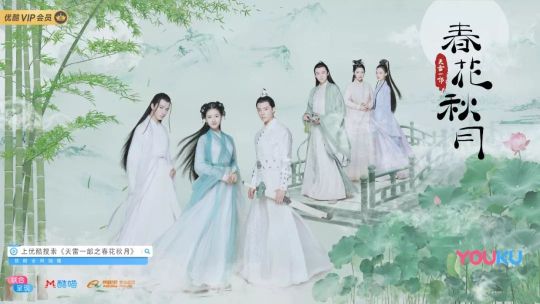
15. The Legends (招摇) - 6.2 [8.5]
Time Period: Wuxia
Starring: Bai Lu (白鹿), Xu Kai (许凯)
Episode Number: 56
Plot: While attempting to take her predecessor’s Wanjun Sword, Lu Zhao Yao is ambushed by the ten immortal sects and dies. She mistakenly believes Li Chen Lan, who is her best ally, is related to the incident after he is revealed to be the demon king’s son. Five years later, Li Chen Lan has taken over the position of the Wanlu sect leader, and Zhao Yao decides to exact revenge. She who is now a spirit, possesses the body of Qin Zhi Yan, a female disciple of the Immortal Sect, and with the help of the newly gained body, she becomes the direct disciple of Mo Qing aka Li Chen Lan with the aim of killing him. But things don’t go as she planned, when she slowly starts to fall in love with him instead.

16. Novoland: Eagle Flag (九州缥缈录) - 6.1 [8.0]
Time Period: Fictional
Starring: Liu Haoran (刘昊然), Song Zu’er (宋祖儿)
Episode Number: 56
Plot: Lu Gui Chen is the heir of the nomadic Qingyang tribe, and is sent to the Eastern Land as hostage. He meets Ji Ye, an unfavoured illegitimate son who is training to become a warrior, and Yu Ran, the princess of the Winged tribe. At the same time, powerful warlord Ying Wu Yi has been maintaining a firm control over the Emperor, giving him unprecedented power over the nobles. Lu Gui Chen, Ji Ye, and Yu Ran decide to join the decisive battle against Ying Wu Yi at Shangyang Pass, but unbeknownst to them, an even darker conspiracy is yet to unfold.
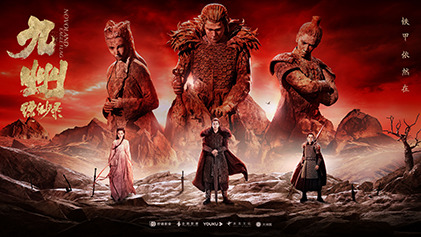
17. Princess Silver (白发) - 6.0 [8.1]
Time Period: Fictional
Starring: Zhang Xueying (张雪迎), Li Zhiting (李治廷)
Episode Number: 58
Plot: A story that follows a princess with amnesia who meets a prince that did not want to marry her and how they find a place for themselves despite the complications of the time.

18. Heavenly Sword and Dragon Saber (倚天屠龙记) - 5.8 [8.3]
Time Period: Wuxia
Starring: Zeng Shunxi (曾舜曦), Chen Yuqi (陈钰琪)
Episode Number: 50
Plot: Legend said that whoever obtains the Heavenly Sword and Dragon Slaying Saber can rule the world. Zhang Wuji was orphaned at a young age by schemes to discover secrets of these two weapons. Despite his preference to live a non-violent life, Wuji found himself embroiled in the struggles for power and must fight to save himself and others he loves...
Related Shows: The Legend of the Condor Heroes (射雕英雄传), The Return of the Condor Heroes (神雕侠侣), Demi Gods and Semi Devils (天龙八部), The Smiling Wanderer (笑傲江湖)

19. I Will Never Let You Go (小女花不弃) - 5.6 [7.8]
Time Period: Fictional
Starring: Lin Yichen (林依晨), Zhang Binbin (张彬彬)
Episode Number: 51
Plot: The story revolves around a young wanderer with an extraordinary business sense and the masked hero who saves her which ultimately results in them falling in love. When the wanderer is revealed to be the Divine Maiden who will obtain a legendary treasure, various enemies hunt her down. She then lives life on the run and meets her savior who turns out to be the ambitious prince that wants to take the throne.

20. The Plough Department of the Song Dynasty (大宋北斗司) - 5.3 [8.0]
Time Period: Song Dynasty
Starring: Xu Ke (徐可), Dai Luwa (代露娃)
Episode Number: 36
Plot: The Plough (Big Dipper) Department is a special investigation institution that works for the emperor of the Northern Song Dynasty. Tai Sui and his partners work together to break odd cases and punish the evils. Through a series of cases, Tai Sui found out there was a hidden conspiracy behind these cases, and it was related to his unknown past.
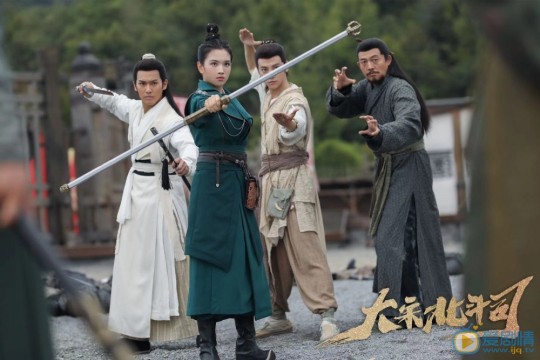
21. Please Give Me a Pair of Wings (请赐我一双翅膀) - 5.0 [8.1]
Time Period: Chinese Republic
Starring: Ju Jingyi (鞠婧祎), Yan Yalun (炎亚纶)
Episode Number: 60
Plot: It tells the story of Lin Jiu Ge, the daughter of Shanggu's Police Commissioner who was framed and unjustly imprisoned. She will have the help of young police detective Long Tian Yu to hopefully find the real murderer. Will Lin Jiu Ge be able to get her revenge?
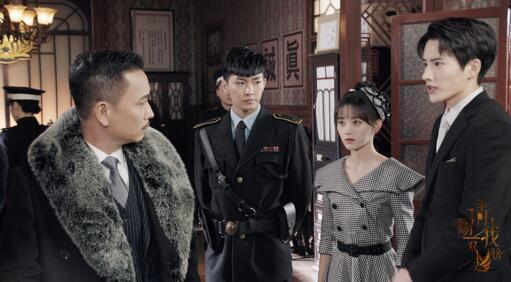
22. Legend of Haolan (皓镧传) - 4.8 [7.8]
Time Period: Warring States Period
Starring: Wu Jinyan (吴谨言), Nie Yuan (聂远)
Episode Number: 62
Plot: During the Warring States Period, Li Hao Lan (Wu Jin Yan) is forced out of her own home and sold as a slave despite being the daughter of the Public Censor of Zhao. Purchased by Lu Bu Wei (Nie Yuan), she is gifted to Ying Yi Ren (Mao Zi Jun) a Qin Royal who is serving as a hostage to guarantee the armistice between the Qin and Zhao states. A dangerous battle begins in result of their arrival and they must rely on their wits to survive.
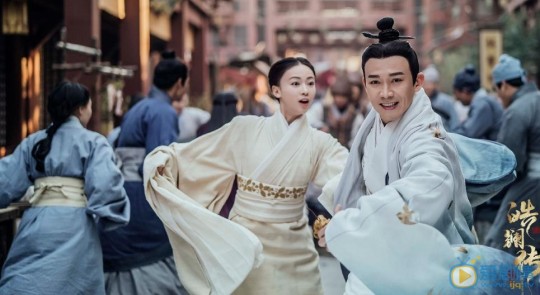
23. The Great Craftsman (筑梦情缘) - 4.6 [8.0]
Time Period: Chinese Republic
Starring: Hua Jianhua (霍建华), Yang Mi (杨幂)
Episode Number: 60
Plot: Military conflicts in the Warlord era has resulted in unbearable conditions. Amidst the chaos, Shen Qinan's family experiences a terrible misfortune. The four brothers and sisters overcome many hurdles to flee to Shanghai but they are forced to separate. Many years later, they will reunite again. Shen Qinan manages to climb from the depths of despair to make a name for himself as a famous architect in the Shanghai Bund. He meets Fu Hanjun, a gifted architect who puts the people's needs and traditional Chinese architecture at the heart of her designs. During Shanghai's development, Shen Qinan works hard to build affordable homes for the people. When the Second Sino-Japanese War erupted, Shen Qinan uncovers a conspiracy and plays his part to prevents many deaths.
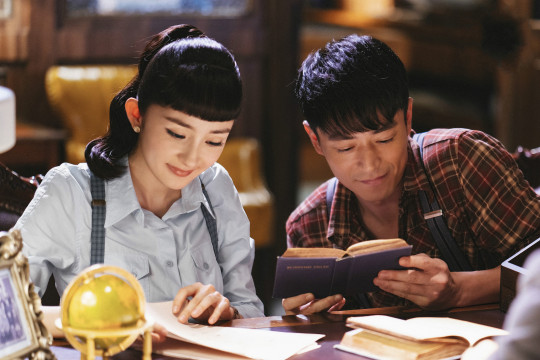
24. Legend of the Phoenix (凤弈) - 4.6 [7.7]
Time Period: Fictional
Starring: He Hongshan (何泓姗), Xu Zhengxi (徐正溪)
Episode Number: 41
Plot: Set in the fictional Eastern Liang dynasty, circus performer Ye Ningzhi’s (He Hongshan) troupe enters the palace and stages a performance to celebrate the empress dowager’s birthday. The ambitious grand princess (emperor’s sister) decides to cause mischief by framing her for treason, though the heroine is saved by strategist Wei Guang (Xu Zhengxi), and falls in love at first sight with him. When Ye Ningzhi enters the palace two years later as the empress’ maid, she stands up for her fellow servants, and refuses to sacrifice her conscience in the face of power. Ye Ningzhi also works together with Wei Guang to crush the grand princess’ plan to usurp the throne, and catches the eye of the emperor in the process.
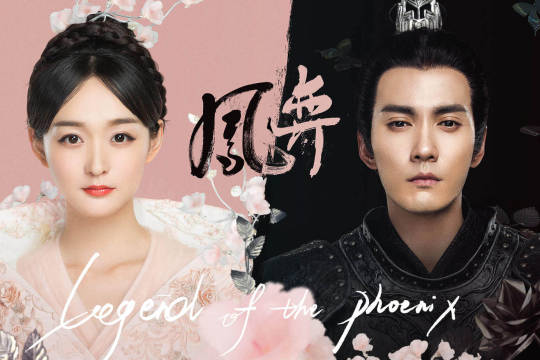
25. The New Legend of the White Snake (新白娘子传奇) - 4.4 [7.4]
Time Period: Fictional
Starring: Ju Jingyi (鞠婧祎), Yu Menglong (于朦胧)
Episode Number: 36
Plot: The story is set in Hangzhou, then the capital of the Southern Song court, and is about a 1,000-year-old snake spirit that's transformed into a beautiful woman and falls in love with a young man. However, a Buddhist monk intervenes.

26. Listening Snow Tower (听雪楼) - 4.3 [7.9]
Time Period: Wuxia
Starring: Qin Junjie (秦俊杰), Yuan Bingyan (袁冰妍)
Episode Number: 56
Plot: A story that follows the master of Listening Snow Tower and the woman that he loves. He is a martial arts expert known to be a dragon among men and she is known as the blood demon's daughter.
27. Queen Dugu (独孤皇后) - 3.9 [7.4]
Time Period: Sui Dynasty
Starring: Chen Qiao’en (陈乔恩), Chen Xiao (陈晓)
Episode Number: 50
Plot: After their family was wrongfully persecuted due to the machinations of a corrupt official, Dugu Jia Luo held strict expectations for herself to be independent and strong even at a young age. Her husband Yang Jian is a man of great spirit. He is a warrior, skilled in battle, who rises up the ranks to become the Emperor. With Dugu Jia Luo by his side, they succeed in uniting the country under the Sui Dynasty. The husband and wife stay in a monogamous relationship despite their imperial status and come to be revered by people as the two saints due to their extraordinary contributions to a new golden age.

28. Investiture of the Gods (封神演义) - 3.3 [7.2]
Time Period: Shang/Zhou Dynasty
Starring: Luo Jin (罗晋), Wang Likun (王丽坤)
Episode Number: 56
Plot: In the time of King Zhou of Shang, the Gods are mostly gone and the demons trouble the human world. The Primeval Lord of Heaven decides to use the war between the Zhou and Shang dynasties to choose a new generation of Gods to ascend the celestial realm. His sends his apprentices forth in search of righteous candidates: Jiang Zi Ya assists Ji Fa in governing his new empire Zhou dynasty, Shen Gong Bao infiltrates the Shang dynasty with Su Da Ji seducing the king to rack havoc on the world, and Yu Ding Zhen Ren helps Yang Jian, a human with a third eye, to achieve his potential. The outcome of selection lies in the fates of humans.
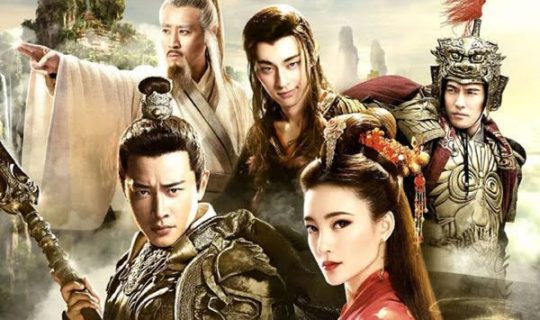
Ongoing Dramas:
Joy of Life (庆余年) - 8.0 (ending 2/12/20)
Royal Nirvana (鹤唳华亭) - 7.5 (ending ??)
Sword Dynasty (剑王朝) - 6.8 (ending 1/11/20)
The Romance of Hua Rong (一夜新娘) - 6.8 (ending 12/31/19)
Blossom In Heart (海棠经雨胭脂透) - 6.6 (ending 12/19/19)
To Get Her (惹不起殿下大人) - N/A (ending 12/30/19)
The Mysterious World (天机十二宫) - N/A (ending ??)
Upcoming Dramas:
Dreaming Back to Qing Dynasty (梦回) - N/A (starting 12/14/19)
Disclaimer: Obviously these rankings are just based off of others’ opinions. I really liked “Heavenly Sword and Dragon Sabre” even though inseams the majority of people didn’t. Whatever show seems interesting to you, watch it! The majority of guzhuang dramas are made with delicacy and attention to detail. I’ve seen reviews complimenting some dramas with relatively lower ratings, so of course every drama has its fans. I would obviously suggest you all go and watch the top 5 if they sound interesting to you.
135 notes
·
View notes
Note
Do you mind expanding on Wu's operations against Wei in 237, as well as Wei's invasion in 250? Thanks!
I wrote about the 237 operations in my article on 241′s Red Crow Campaign.
The short explanation of the 250 invasion (for which I don’t have a snappy name):
In 250 (technically January of 251 actually), Wang Chang proposed invading Wu, possibly in response to some construction Sun Quan commissioned earlier that year to obstruct such an operation. He also noted the internal discord in Wu and thought Wei could take advantage of it. Sima Yi agreed and, following Wang Chang’s plan, sent armies to three key locations. Zhou Tai (executor of Xincheng/Shangyong) was sent to attack Zigui and Wu in Yidu; Wang Ji (inspector of Jing) was sent to Yiling; Wang Chang himself attacked Jiangling. All of these were Wu’s key positions north of the Jiang, in the northwest part of Jing.
This campaign achieved mixed results but was generally unsuccessful. Wang Chang’s attack on Jiangling is the best recorded part.
Things went well for Wang Chang at first. He used a pontoon bridge to outflank the defenders at Jiangling, led by Zhu Ji (Zhu Ran’s son; later named Shi Ji). Zhu Ji tried to break the encirclement but suffered heavy losses and had to fall back into the city. Hoping to draw Zhu Ji out, Wang Chang then feigned retreat. The tactic worked and Zhu Ji attempted to pursue but was ambushed, suffering heavy losses.
However, Wang Chang was still unable to capture Jiangling itself. Soon, he genuinely began to withdraw. Zhu Ji sent a letter to nearby Zhuge Rong (son of Zhuge Jin and brother of Zhuge Ke) saying that he wanted to pursue but had lost much of his strength. Zhuge Rong agreed to join him, so Zhu Ji set out and attacked Wang Chang’s camp some 30 han furlongs from Jiangling. At first the battle went well for him, but Zhuge Rong never arrived to Zhu Ji was forced to retreat again.
So Wang Chang had a lot of success in the field, but he still couldn’t take Jiangling. This was a familiar theme to Wei; the same thing happened during the Great River Campaign.
Meanwhile, Wang Ji besieged Yiling/Xiling, opposed by Bu Xie (son of Bu Zhi). Bu Xie simply held to his defenses and waited Wang Ji out. Unable to capture the city, Wang Ji instead seized a major supply depot in the area, captured some of the soldiers, and resettled the population in a way favorable to Wei. So he found some merit in the field but was also, ultimately, unsuccessful in securing his primary objective.
The least is recorded about Zhou Tai’s efforts at Wu and Zigui. We are told that he found some success in the field as well but was also not able to capture the city. He retreated in February of 251 along with Wang Chang and Wang Ji. Despite performing well in the field, none were able to capture their intended targets, rendering the campaign a firm victory for Wu.
5 notes
·
View notes
Text
Also notable from the same essay: Cao Pi’s DOZENS OF BITCHY PUBLIC SERVICE ANNOUNCEMENTS about how much better Wei produce/textiles/horses are than Wu’s and Shu’s
The south produces oranges. They are so sour that they ruin one’s teeth. Sweet ones are few and far between.
The south produces longans and lychees; how can they compare with grapes and rock honey [cane sugar] of the western kingdoms? Now We bestow the lychees on civil and martial officials, so that they shall all know this fruit has a bland flavor.
To the south of Yangzhi river only Changsha claims to have good rice, but how could they even hold a candle to the non-glutinous rice of Xincheng? When you cook it in the direction the wind is blowing, you can smell its fine aroma from five leagues away.
There are many kinds of precious fruit from the Central Kingdom. Let us now speak of the grape for you. When the vermillion summer is transitioning into autumn but the remaining heat still lingers on, one gets drunk and wakes up with a hangover, and eats grapes covered with dews. They are sweet but not cloying, crisp but not acerbic, cool but not cold; with an enduring flavor and abundant juice they get rid of irritation and relieve nausea. One can also use grapes to make wine, which is sweeter than ale. One becomes drunk from it easily but recovers just as easily. Just talking about it makes one’s mouth water, not to mention actually eating it. How could fruits from other places match it?
According to Magistrate Meng of Xincheng, Shu piglets, lamb, chickens and ducks all have a bland flavor, and that is why the Shu people love to use sugar and honey when they cook.
... ...... CAO PI ... TROLLING YELP FOR POSITIVE REVIEWS OF ANY OTHER RESTAURANT
I also liked some of the thank you note poem examples:
Two gift poems by a woman poet named Liu Lingxian, who was Liu Xiaowei’s sister, deserve special note. One is a quatrain accompanying a gift of gardenia presented to a Lady Xie, in which Liu makes a witty pun about the name of gardenia (zhizi 栀子) and “this person” (zhizi 之子): “the gardenia/this person touches my heart most of all.” The other is a poem expressing gratitude to a Ms. Tang, an entertainer, for her gift of threaded needles. Threading needles was a custom observed by young women on the eve of the seventh day of the seventh month, a festival celebrating the reunion of the separated heavenly lovers, the Cowherd and the Weaving Girl.To thread needles with many-colored threads swiftly and successfully in the moonlight on this night was regarded as a good sign for obtaining dexterity in needlework. In her poem, after giving obligatory praises of Ms. Tang’s needlework skills, Liu Lingxian adds a personal touch by reflecting on her circumstances: “The widow’s boudoir is devoid of silks and damasks, / Holding your gift in my hands, I feel pity for myself.”
and then there’s liu lingxian’s brother’s callout poem for cao pi’s orange depreciation:
...
Right away one could Peel away its golden coat, And drink its jasper juice. Its sweetness exceeds the duckweed fruit, Its coolness is only second to the watery jade. It immediately gets rid of frustration and nausea, And cures the hangover at once. I snicker at the prime minister of Qin from long ago--- Who ingested the fruit without cutting it open. I laugh at the emperor of Wei in the distant past--- Who encountered the taste that ruined his teeth.
3 notes
·
View notes
Text

если берёте к себе в паблик пожалуйста указывайте мой тгк @wifeydaydream
#art#bab#bing an ben#he yu#xie xincheng#xie xue#case file compendium#hexie#meatbun#meatbun doesn't eat meat#erha#2ha#2ha novel#the husky and his white cat shizun#ranwan#chu wanning#dumb husky and his white cat shizun#mo ran#taxian jun
41 notes
·
View notes
Text

He Yu: *I hate cigarette smoke, but it’s like I’m kissing Se-ge with a cigarette ^^ *
Xie Qingcheng: *he hates it when I smoke, what’s wrong with him? God, what an idiot. Even gays are not as gay as He Yu*
#case file compendium#bab#he yu#hexie#meatbun#meatbun doesn't eat meat#xie xincheng#art#danmei#bing an ben
48 notes
·
View notes
Text

если берёте в паблик пожалуйста указывайте мой тгк @wifeydaydream
#hexie#he yu#xie xincheng#bab#bing an ben#case file compendium#meatbun#meatbun doesn't eat meat#danmei#история болезни#медкарта#хэсе
16 notes
·
View notes
Text

he yu core
если берёте в паблик пожалуйста ��казывайте мой тгк @wifeydaydream
#bab#bing an ben#heyu#xie xincheng#case file compendium#meatbun#meatbun doesn't eat meat#erha#danmei
16 notes
·
View notes
Text

если берёте в паблик пожалуйста указывайте мой тгк @wifeydaydream
11 notes
·
View notes
Note
Could you tell me about Deng Xia? The pixiv artist I showed you a while back really likes to include him in his Huan Wen arts (along with Xie Xuan, Zhu Xu, Chi Chao and Huan Chong) but I can't find much info about Deng that's appealing enough for him to be let alone mentioned
Deng Xia was the son of the Eastern Jin general and official Deng Yue, originally from Chen commandery. He has a tiny biography attached to that of his father in JS081, he is also mentioned in some excerpts of now lost texts. Since there is a lot of overlap between the different fragments, I have edited them together:
A basic biography from JS081, Fu Tao (c. 317 – 396): The Famous among the Grand Marshal's Staff and Functionaries, Xu Guang's (352 – 425) Annals of Jin, and Sheng Hongzhi (5th century) Annals of Jingzhou:
Deng Xia, courtesy name Yingyuan, was a native of Chen commandery, he was the son of the General who Pacifies the South, Yue. His bravery and strength surpassed other people, his vigour overshadowed the time period. At the time people compared him to Fan Kuai. Huan Wen used him as Army Advisor, and he several times accompanied Wen's campaigns and attacks. He was successively General of the Best of the Army and Grand Warden of Jingling, and was noted as a famous general.
At the service of Fangtou, Wen was ashamed and furious in his breast, and moreover feared and dreaded Xia's bravery and resoluteness, and because of that dismissed Xia from office. Soon after he passed on from illness. In the middle of Ningkang [373 – 375], he was posthumously conferred Grand Warden of Luling.
According to JS008, Annals of Emperor Ai, he took part in operations around Luoyang in 362 after that place came under attack from Murong Wei's general Lü Hu:
5th Month, dingsi [5 July 362], dispatched the Commander of the Palace Gentlemen of the North, Yu Yi, and the Grand Warden of Jingling, Deng Xia, to use a naval host to rescue Luoyang.
Autumn, 7th Month [7 August – 4 September], Lü Hu and others withdrew to defend Xiaoping ford. … Deng Xia advanced to garrison Xincheng. Yu Yi’s section commander He Qian fought with Murong Wei’s general Liu Ze at Tanqiu, routing him.
JS008, Annals of the Duke of Haixi, adds a detail from the Fangtou campaign in 369:
9th Month, wuyin [17 October 369], Huan Wen’s assistant generals Deng Xia and Zhu Xu met Wei’s general Fu Mobo at Linzhu, also greatly routing him.
On wuzi [27 October], Wen arrived at Fangtou.
Deng Xia probably participated in more campaigns than this, but no records survive.
The Shishuo xinyou tells this anecdote:
After Deng of Jingling had been dismissed from office, he went to the imperial tombs. Passing by he saw the Grand Marshal, Excellency Huan. His Excellency asked him, saying: “Sir, why are you so much thinner?” Deng said: “For being ashamed before Shuda, [I am] not able to not regret the broken pot”
(Meng Min, courtesy name Shuda, lived during Eastern Han. Once, when the pot he was carrying fell to the ground, he continued walking without looking back. Asked about, he answered: “The pot is broken. What is the point of looking at it?”)
JS081 and the Annals of Jingzhou also tells this story:
North of Xiangyang City, at an inlet of the Mian River there is a pool which is extremely deep, previously it had an evil dragon(蛟) which was often harmful to people. Deng Xia was Grand Warden of Xiangyang, he was vigorous and resolute. He pulled out his sword and entered the river. The dragon coiled around his feet, Xia brandished his sword and cut the dragon into several pieces, and then came out. The flowing blood coloured the water cinnabar. His bravery was ahead of the times, since then there were no troubles with dragons.
Liu Jingsheng's (5th century) Garden of the Strange has a variant of the same:
In Jing province, on the banks of the Mingjiang, there often was an evil dragon killing people, the deaths among those who were washing or drawing water were not separated by a year. In the middle of the Shengping era [357 – 361], Chen commandery's Deng Xia, courtesy name Yingyan, was Grand Warden, he was habitually brave and strong. He was furious and entered the river to seek out the dragon, and managed easily to fist-fight with it. He then pulled and brought it forth to the bank, and wished to lop off and kill it. His mother told him: “A dragon is really a divine creature, better not to kill it [*] . Now [you] can make an incantation, now it will not again be harmful.” Xia made an incantation and released it. From then until the present has passed without this trouble.
* Text actually reads “better to swiftly kill it” 寧忽殺之, but from context seems best to emend to 寧勿殺之
3 notes
·
View notes
Text
Annals of Emperor Xiaowu, Part 2
[From JS009. On yihai (30 November 383), the various generals fought with Fu Jian at Fei river, greatly routing him. The prisoners and beheaded tallied several tens of thousands.]
[Taiyuan 4]
[3 February 379 – 21 February 380]
4th Year, Spring, 1st Month, xinyou [10 February], a great amnesty. Those commanderies and counties suffering floods or droughts had reduced their rents and taxes.
On bingzi [25 February], paid respect to Jianping and others, 7 Mounds.
2nd Month, wuwu [8 April? 3rd Month], Fu Jian sent his son Pi to attack and take Xiangyang, and capture the Commander of the Palace Gentlemen of the South, Zhu Xu. He also took Shunyang.
3rd Month [3 April – 2 May], a great plague.
On renxu [12 April], a decree said:
Crafty bandits are unrestrained and inhibited, the frontier defenders are overturn and lost, worries over the boundary and border, affairs adds to pacifying daily [?]. Thus inside and outside the multitude officials, each exhausting their hearts and exerting their strength, thereby quieting the numerous affairs.
Also yearly the crops do not climb, the hundred families are lacking much. Thus decreeing in managing worshipping, affairs follow frugal agreements, the nine relatives provide and give, the multitude officials stockpiling salaries, opportune to possibly reduce by half.
Altogether the various services and expenses, from not essential to the affairs of the armies and state, all ought to be suspended and scrutinized, thereby in the time of relief apply oneself [?].
On guiwei [3 May?], sent the General of the Right, Mao Wusheng to lead a host to attack Shu.
Summer, 4th Month [3 May – 31 May], Fu Jian's general Wei Zhong took Weixing. The Grand Warden, Ji Yi, died there.
5th Month [1 June – 30 June], Fu Jian's generals Ju Nan and Peng Chao took Xuchi. The Interior Clerk of Gaomi, Mao Zaozhi was captured by the traitors.
6th Month [1 July – 29 July], great drought.
On wuzi [7 July], the General who Conquers the Caitiffs, Xie Xuan, fought with Nan and Chao at Junchuan, greatly routing them.
Autumn, 8th Month, dinghai [4 September], used the General of the Left, Wang Jun [JS093], as Supervisor of the Masters of Writing.
On yiwei [12 September], a violent storm, scattering sand and stone.
9th Month [27 September – 26 October], bandits killed the Grand Warden of Jian'an, Fu Zhan.
Winter, 12th Month, jiyou, New Moon [24 January], the sun was eclipsed. [OK]
[Taiyuan 5]
[22 February 380 – 9 February 381]
5th Year, Spring, 1st Month, yisi [20 March], paid visit to the Chongping Mound [the tomb of Emperor Kang].
Summer, 4th Month [21 May – 18 June], great drought.
On guiyou [16 June], a great amnesty for punishments of 5 years and below.
5th Month [19 June – 18 July], great floods. Used the Minister over the Masses, Xie An, as General of Guards, with the Same Ceremonies as the Three Ministers.
6th Month, jiayin [27 July], shook the four pillars of the Cherished Composition Hall, killing 2 people attending within.
On jiazi [6 August], due to successive years of desolate scarcity, a great amnesty. Unpaid rent and overdue debt from the 3rd Year of Taiyuan and before, all were waived and eliminated by it. Thus for bachelors, the widowed, destitute, solitary, orphaned and those not able to maintain themselves, each person were bestowed 5 hu grains.
On dingmao [9 August], used the General of Agile Cavalry, the King of Langye, Daozi, as Minister over the Masses.
Autumn, 9th Month, guiwei [24 October], the August Empress, Ms. Wang, expired.
Winter, 10th Month [14 November – 12 December], the Grand Warden of Jiuzhen, Li Xun, occupied Jiao province in rebellion.
11th Month, yiyou [25 December], buried the Settling [ding] August Empress in the Longping [“Prosperous Peace”] Mound.
[Taiyuan 6]
[10 February 381 – 30 January 382]
6th Year, Spring, 1st Month [10 February – 11 March], the Emperor began respecting Buddhist regulations. He established a monastery within the halls, and pulled in various sramanas to accordingly reside there.
On dingyou [7 March], used the Master of Writing Xie Shi [JS079] as Supervisor of the Masters of Writing.
Began setting up the office of Imperial Clerk of Controlling Transport [?].
Summer, 6th Month, gengzi, New Moon [8 July], the sun was eclipsed [OK].
In Yang, Jing and Jiang provinces great floods.
On jisi [6 August], changed the system and measurements, diminishing bothersome expenditures, reducing magistrates' soldier staff [?] with 700 people.
Autumn, 7th Month, bingzi [13 August], pardoned punishments of 5 years and below.
On jiawu [31 August], the Grand Warden of Jiaozhi, Du Yuan, beheaded Li Xun. Jiao province was pacified.
A great famine.
Winter, 11th Month, jihai [3 January? In the 12th Month], used the Great General who Garrisons the Army, Chi Yin, as Minister of Works.
Tan Yuanzhi, a native of Kuaiji, rebelled, titling himself General who Calms the East. The Army Advisor who Garrisons the Army, Xie Aizhi, punished and pacified him.
12th Month, jiachen [8 January], Fu Jian dispatched his Grand Warden of Xiangyang, Yan Zhen to rob Jingling. The Grand Warden of Xiangyang, Huan Shiqian, punished and captured him.
[Taiyuan 7]
[31 January 382 – 18 February 383]
7th Year, Spring, 3rd Month [31 March – 28 April], Fan Xiong of Linyi dispatched envoys presenting the things of the region.
Autumn, 8th Month, guimao [4 September], a great amnesty.
9th Month [24 September – 23 October], five states of the Eastern Yi dispatched envoys to come with a tribute of things of their region.
Fu Jian's general Du Gui burnt and torched the grain fields north of the Mian, plundered the hundred families of Xiangyang and left.
Winter, 10th Month, bingzi [6 December], thunder.
[Taiyuan 8]
[18 February 383 – 7 February 384]
8th Year, Spring, 2nd Month, guiwei [12 April], yellow fog at the Four Passes.
3rd Month [19 April – 17 May], in Shixing, Nankang and Luling great floods, covering the land 5 zhang deep.
On dingsi [16 May], a great amnesty.
Summer, 5th Month [17 June – 14 July], the General who Assists the State, Yang Liang, attacked Shu. He uprooted 5 cities and captured Fu Jian's general Wei Guang.
Autumn, 7th Month [15 August – 12 September], the General who Soars like an Eagle, Guo Qia with with Fu Jian's general Zhang Chong at Wudang, greatly defeating him.
8th Month [13 September – 12 October], Fu Jian led a multitude to cross the Huai. Dispatched the Chief Controller of Conquering and Punishing, Xie Shi, the General of the Best of the Army, Xie Xuan, the General who Assists the State, Xie Yan [JS079], the Commander of the Palace Gentlemen of the West, Huan Yi [JS081] and others to resist him.
9th Month [13 October – 10 November], decreed the Minister over the Masses, the King of Langye, Daozi to Record the Affairs of the Six Departments of the Masters of Writing.
Winter, 10th Month [11 November – 10 December], Fu Jian's younger brother Rong took Shouchun.
On yihai [30 November], the various generals fought with Fu Jian at Fei river, greatly routing him. The prisoners and beheaded tallied several tens of thousands. They captured Jian's sedan chair and Cloud Mother Chariot [?].
11th Month, gengshen [14 January? 12th Month], decreed the General of Guards, Xie An, to service [?] and return the host to Jincheng.
On renzi [6 January], established the King of Chenliu's Heir, Lingdan, as King of Chenliu.
12th Month, gengwu [24 January], due to the robber difficulties beginning to be pacified a great amnesty.
Used the General of the Army of the Centre, Xie Shi, as Prefect of the Masters of Writing.
Started alcohol prohibitions. First increased the hundred families taxes in grain, 5 shi per mouth.
The former [?] King of Guoding, Zhai Liao, betrayed Fu Jian, and raised troops in Henan. Murong Chui from Ye united with Liao and thereupon attacked Jian's son Hui at Luoyang.
The Duke of Chouchi, Yangshi fled and returned to Longyou, and dispatched envoys calling himself a vassal.
[Taiyuan 9]
[8 February 384 – 26 January 385]
9th Year, Spring, 1st Month, gengzi [23 February], enfeoffed the King of Wuling's grandson Bao as King of Linchuan.
On wuwu [12 March?, 2nd Month], established the King of Xinning, Xi's son Zun as King of Xinning.
On xinhai [5 March], paid visit to Jianping and others, the four Mounds.
The General who Gallops like Dragon, Liu Laozhi [JS084], overcame Qiaocheng. The General of Chariots and Cavalry, Huan Chong's section general Guo Bao attacked Xincheng, Weixing and Shangyong commanderies. [They?] surrendered to him.
2nd Month, xinsi [4 April], the Envoy Holding the Tally, Commander-in-Chief of All Army Affairs of Jing, Jiang, Liang#, Ning, Yi, Jiao and Guang provines, General of Chariots and Cavalry and Inspector of Jing province, Huan Chong, passed on.
Murong Chui from Luoyang together with Zhai Liao attacked Fu Jian's son Pi at Ye.
3rd Month [7 April – 6 May], used the General of Guards, Xie An as Grand Guardian.
Fu Jian's Senior Clerk of Beidi, Murong Hong, and Grand Warden of Pingyang, Murong Chong, both rose with troops and betrayed Jian.
Summer, 4th Month, jimao [1 June], added to and set up Teachers of the Grand School, 100 people.
Enfeoffed Zhang Tianxi as Duke of Xiping.
Sent the Grand Warden of Jingling, Zhao Tong to attack Xiangyang. He overcame it.
Fu Jian's general Yao Chang betrayed Jian, and raised troops in Beidi. He established himself as king, the state titled Qin.
6th Month, guichou, New Moon [5 July], the Chongde August Empress Dowager, Ms Chu, expired.
Murong Hong was killed by his junior uncle Chong. Chong called himself August Brother-Heir.
Autumn, 7th Month, wuxu [19 August], dispatched the Combined Minister of Works, the King of Gaomi, Chinzhi, to repair and pay visit to the 5 Mounds of Luoyang.
On yiyou [30 August], buried the Prosperous and Dedicated [kangxian] August Empress in the Congping Mound.
Baiji dispatched envoys to come with a tribute of things of their region.
Fu Jian and Murong Chong fought to the west of Zheng. Jian's host achieved defeat.
8th Month, wuyin [28 September], the Minister of Works, Chi Yin, passed away.
9th Month, xinmao [11 October], the Chief Controller of the Vanguard, Xie Xuan attacked Fu Jian's general and Inspector of Yi province, Zhang Chong, at Juancheng, and overcame him.
On jiawu [14 October], added to the Grand Guardian, Xie An, Great Commander-in-Chief of All Army Affairs of Yang, Jiang, Jing, Si, Yu, Xu, Yan, Qing, Ji, You, Bing, Liang#, Yi, Yong and Liang, 15 provinces.
Winter, 10th Month, xinhai, New Moon [31 October], the sun was eclipsed [OK].
On dingsi [6 November], the King of Hejian, Tanzhi, passed away.
On yichou [14 November], due to the profound images deviating from the norms, a great amnesty.
On gengwu [19 November], established the former King of Xincai, Huang's younger brother Chong as King of Xincai.
Fu Jian's Inspector of Qing province, Fu Lang, led the multitudes to come and surrender.
12th Month [29 December – 26 January], Fu Jian's general Lü Guang, claimed authority in Heyou, titling himself Duke of Jiuquan.
Murong Chong usurped the throne of August Emperor at Efang.
1 note
·
View note